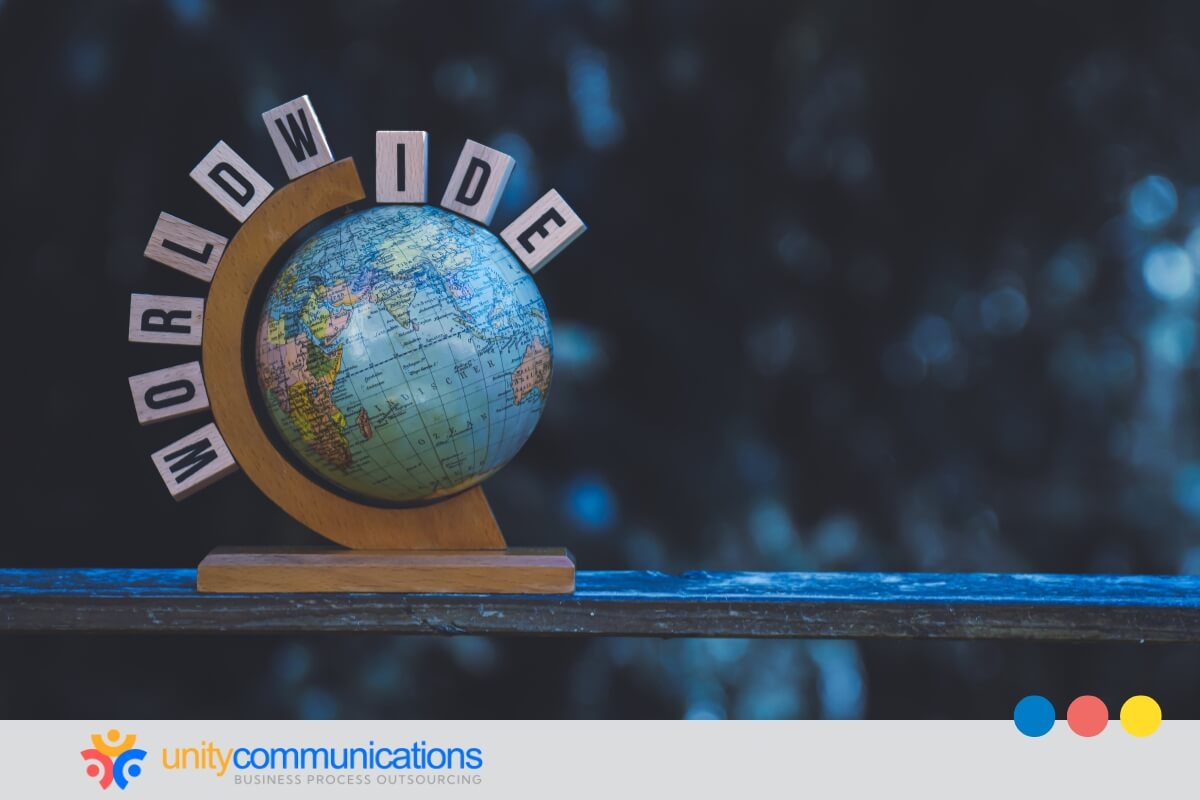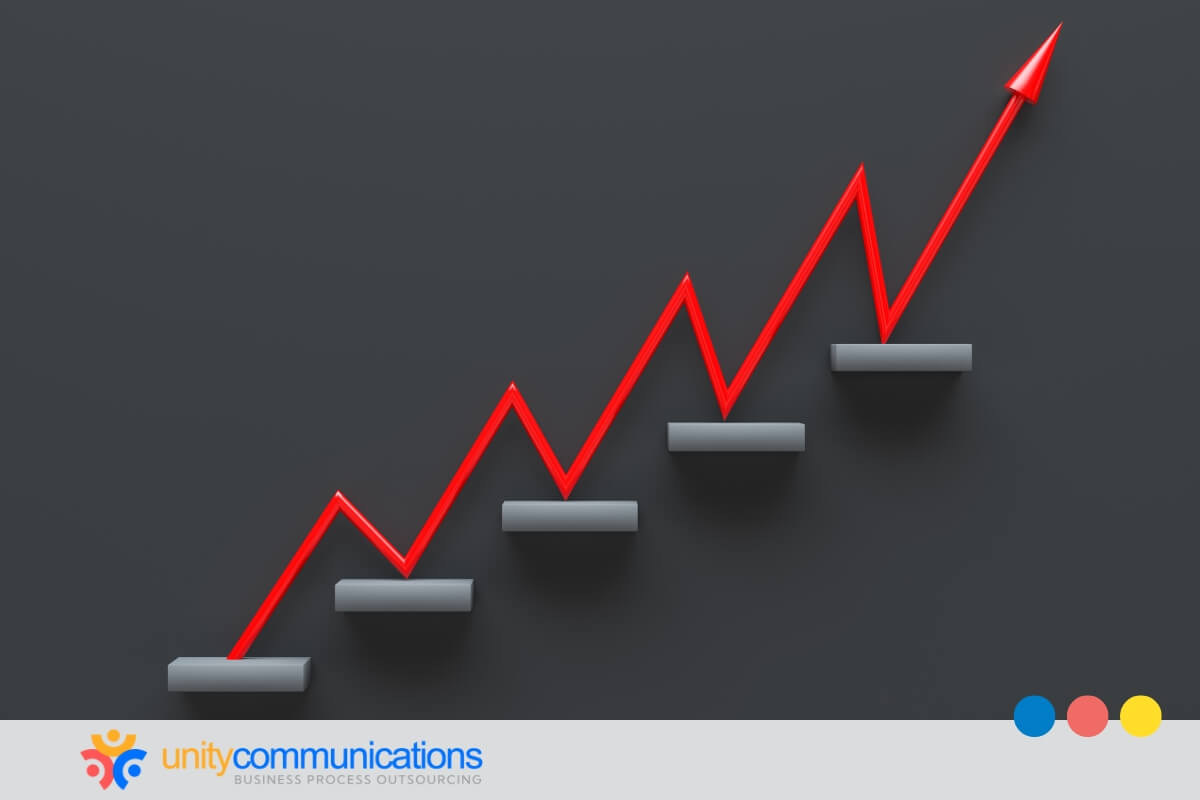Table of Contents
Navigating the complexities of international logistics is challenging. You must manage cross-border shipping and customs clearance while maintaining cost efficiency and regulatory compliance.
Business process outsourcing (BPO) for logistics provides the infrastructure, expertise, and scalability to streamline global operations.
This article explores leveraging logistics outsourcing to accelerate global expansion, mitigate risks, and achieve long-term success. Read below to learn more!
5 steps to leverage logistics outsourcing for global expansion

According to Future Market Insights, the logistics outsourcing industry could grow from $1.12 trillion in 2024 to $2.15 trillion in 2025. This is due to increasing globalization, demographics, and automation.
This also means more businesses prefer third parties to manage their supply chain. These include transportation, warehousing, inventory management, order fulfillment, freight forwarding, and customs brokerage.
Outsourcing logistics functions:
- Speeds up growth. It provides quicker entry into international markets without significant investments. Hiring local third parties lets you tap into their distribution, transport, and customs networks.
- Reduces delivery lead times. Outsourcing logistics ensures quicker order fulfillment, boosting customer satisfaction in overseas markets.
- Lowers operational risks. Third-party experts provide regional compliance support and deep knowledge of regulations. This minimizes costly errors in new territories.
Third-party BPO companies can become operational bridges into new territories. They can identify the most efficient distribution hubs, manage customs clearance, and even localize last-mile delivery.
To capitalize on these advantages, here are the key steps to logistics outsourcing for global expansion:
1. Assess readiness for global expansion
The first step is to evaluate your supply chain capabilities. Consider the following:
- Can your infrastructure handle international logistics?
- Are your warehousing and fulfillment processes scalable?
- Does your technology stack support global operations?
Next, define your global expansion goals. Are you looking to enter specific markets, improve delivery times, or reduce operating costs? Clear objectives guide your selection of a third-party logistics (3PL) partner and prevent you from paying for unnecessary services.
Third, you must know your product and market fit. Some products might have complex international shipping requirements due to perishability, size, weight, or regulatory restrictions. Before entering new regions, assess local demand. Identify potential import and export barriers, and determine whether your goods suit overseas markets.
Assessing your operational readiness ensures your outsourced logistics strategy supports your growth goals.
2. Identify and select suitable 3PL partners
Choosing the right provider is essential to effectively leverage logistics outsourcing for global expansion. Now, what’s the role of the BPO provider in this context? They help you navigate international shipping requirements and streamline logistics operations.
Look for vendors with a proven track record in international operations. Check for global presence. Ask if they have warehouses, distribution centers, or strategic partnerships in your expanding regions. Their locations should match your growth plans. This way, they can provide on-the-ground support where you need it.
Furthermore:
- Evaluate their customs and compliance capabilities. Ask about their experience managing international regulations, import/export documentation, and customs clearance. A good 3PL provider should offer expertise in trade compliance to avoid costly delays or penalties.
- Assess their digital tools. Determine whether they provide data analytics and API connectivity for border transparency and control. A reliable international BPO company should give access to advanced systems for real-time shipment tracking, inventory visibility, and integration.
The right logistics BPO partner can simplify the global supply chain. It can reduce compliance risks and enhance your visibility when entering new markets.
3. Comply with international trade regulations
When expanding globally, you must deeply understand import and export laws. Otherwise, you risk shipment delays, fines, or goods seizures. All these can hurt your bottom line. In addition, a firm grasp of the fundamentals helps you ask the right questions when vetting a 3PL team.
Countries have different rules. Some products might face restrictions, labeling mandates, or additional certifications. Work with your BPO partner specializing in customs brokerage and country-specific requirements. They can assist with:
- Classifying goods correctly
- Preparing and submitting customs declarations
- Calculating duties
- Managing import and export licenses
- Resolving customs holds or inspections
Some countries also have free trade agreements (FTAs) and trade preference programs that can reduce or eliminate tariffs. Ask your 3PL team whether they offer compliance audits or support in qualifying for these incentives. They help reduce your total landed costs and boost competitiveness.
Logistics outsourcing for global expansion involves minimizing costs and protecting your brand from non-compliance. Partnering with a knowledgeable BPO team helps you grow across borders while keeping your legal risks low.
4. Optimize global supply chain routes and distribution methods
You need accurate, real-time logistics data to decide on worldwide routing and distribution. Unfortunately, poor data quality remains a significant obstacle, costing organizations an average of $12.9 million annually.
Choose a provider with integrated platforms, automated tracking, and dashboards when outsourcing. These tools deliver precise, actionable data for better route planning, carrier selection, and demand forecasting.
Next, collaborate with your BPO partner to analyze the most efficient distribution routes. They should:
- Identify the best shipping lanes.
- Evaluate different modes of transportation (air, ocean, rail, and truck).
- Assess the proximity of fulfillment centers to key customer markets.
Many logistics services use artificial intelligence (AI) tools for route optimization. This technology examines real-time fuel costs, customs delays, and seasonal demand. It reduces transit times, minimizes costs, and improves delivery reliability.
In addition, consider multi-node distribution strategies. Work with your 3PL team to place inventory in multiple regional warehouses instead of relying on a single hub. Decentralization shortens delivery windows, reduces shipping costs, and mitigates disruptions.
Carrier diversification is another optimization tactic. Your 3PL should provide access to a global network of carriers and help you compare service levels, rates, and performance across providers.
These strategies transform your global supply chain into a more resilient, cost-effective network that meets market demands and satisfies customers worldwide.
5. Adapt logistics strategies
When working with a BPO company, you need transparent communication channels and access to performance reports to respond quickly to emerging issues.
Collect and analyze real-time data on order accuracy, delivery times, customer satisfaction, returns, and support tickets. Use the feedback to pinpoint logistics pain points.
Next, integrate flexibility into your BPO contracts and workflows. Ensure your 3PL partner can scale operations, shift inventory between fulfillment centers, or switch carriers. For instance, if demand surges or a trade route fails, you can quickly reroute shipments or shift fulfillment.
Pay attention to external signals that can affect your supply chain. Examples include:
- Macroeconomic trends
- Policy changes
- Weather events
- Labor disruptions
- Geopolitical tensions or global conflicts
Conduct regular strategic reviews with your 3PL company to assess risks and update contingency plans. For instance, if new import rules or shipping delays arise, your provider should suggest alternatives or reroute shipments.
Proactive, data-driven collaboration with your BPO partner can build a logistics strategy that weathers disruptions and seizes new opportunities.
The bottom line

Keep your core strengths and strategic goals at the forefront as you grow your supply chain. Continuously evaluate your logistics operations to confirm they align with your key objectives, whether that’s enhancing customer satisfaction, cutting costs, or facilitating logistics outsourcing for global expansion.
Staying focused on these priorities ensures your logistics efforts deliver meaningful value and support growth.
Let’s connect to learn more about how to scale your logistics operations efficiently worldwide.




